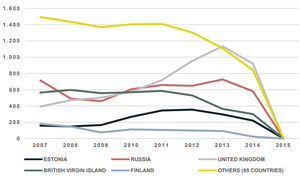Yesterday Danske Bank published the findings of their long-awaited investigation into money laundering through its Estonia Branch – the findings are mind-boggling.
Earlier this summer there was talk of $8.3 billion being laundered through the Bank in Estonia – now initial findings in the Danske report suggest that as much as 40% of the $234 billion that flowed through the bank between 2007 and 2015 could be suspicious.
The sheer volume of the money flowing through Danske’s Estonia branch should have raised alarm bells, consisting of more than nine times Estonia’s GDP. Even worse, the Bank failed to act on indications that something was amiss, even after concerns were raised by senior managers, and JP Morgan terminated its relationship with the branch in 2013 (“due to concerns about the branch’s non-resident customers”).

Source: Bruun & Hjejle (2018) ‘Report on the Non-Resident Portfolio at Danske Bank’s Estonian branch Danske Bank investigation’
The Danske investigation covered 15,000 non-resident accounts of which 6,200 (almost 40%) were high risk and deemed suspicious. Most of these non-resident accounts were held by people or companies from Russia, the UK and the British Virgin Islands.
Danske’s press release refers to the “very unacceptable and unpleasant matters at our Estonian Branch” which hardly does justice to the seriousness of what happened. Money laundering is not a victimless crime – behind the missing billions, ordinary people are the ones that lose out, with money laundering propping up corrupt elites and depriving governments of money that could have been used to improve living standards.
Coming ten years after the financial crash (and a string of other recent European money laundering scandals at ING bank in the Netherlands, Pilatus in Malta and ABLV in Latvia), the case raises serious questions about the integrity of Europe’s banks and their willingness to turn away lucrative, but dirty business. There can be no doubt about it anymore – Europe has a serious money laundering problem.
How did it happen?
Amongst the reasons listed by Danske for the failings are:
- “major deficiencies in the
bank's governance and control systems”
- “we [Danske Bank] had a large
number of non-resident customers in Estonia that we should have never had, and
that they carried out large volumes of transactions that should have never
happened”
- “there is suspicion that
there have been employees in Estonia who have assisted or colluded with
customers”
- “there have been breaches at
management level in several Group functions”
- “there were a number of more or less serious indications during the years, that were not identified or reacted on or escalated as could have been expected by the Group”
What needs to change
It is good that Danske Bank has published this investigation, but the fact that they ignored thousands of high risk accounts for years demands accountability. Danske’s Chief Executive has stepped down, but authorities also need to investigate and pursue any criminal liability of senior executives. In addition, Danske Bank should face a major and dissuasive fine, to disincentivise anything like this happening in future. Too often, the risks of getting caught and the fines do not present a big enough deterrent for banks. More positively, earlier this month, ING was fined $775 million for serial money laundering worth “hundreds of millions of euros”.
On a European level, the case exposes once again the gaps in the EU’s architecture for tackling international money laundering. Many of the recent breaches at the EU banks only came to light after US authorities raised them. Last week the European Commission revealed its plans to hand powers to the European Banking Authority as a watchdog for money laundering in EU banks. This is welcome, and becoming increasingly urgent as money launders exploit weak links in Europe’s banking system.
The story doesn’t stop here. The case will continue to make headlines for months to come, as criminal investigations are ongoing in Denmark and Estonia, and as US law enforcement also look into the case. A key question is: will European banks and governments learn the lessons before the next scandal breaks?



